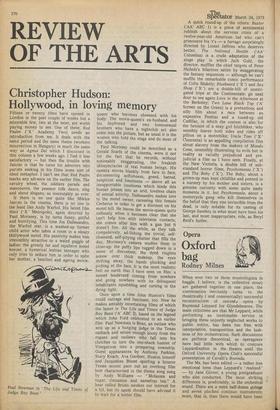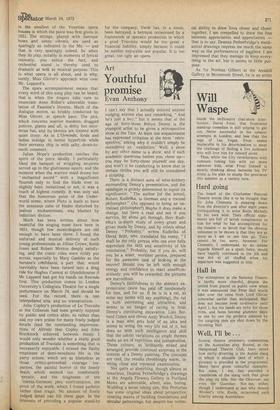Opera
Oxford bag
Rodney Milnes
When ever two or three musicologists (a !haggle, I believe, is the collective noun) are gathered together in one place, the conversation inevitably turns to the theatrically ( and commercially) successful reconstruction of seicentJ opera by Raymond Leppard for Glyndebourne. The main criticisms are that Mr Leppard, while performing an inestimable service in bringing these unjustly neglected works to public notice, has been too free with interpolation, transposition and the lushness of his orchestration. Such discussions are perforce theoretical, as operagoers have had little with which to compare Leppardisation in the theatre until the Oxford University Opera Club's successful presentation of Cavalli's Rosinda.
The Ms. has been edited — a rather less emotional term than Leppard's ' realised ' — by Jane Glover, a young postgraduate who also conducted. The most striking difference is, predictably, in the orchestral sound. There are a mere half-dozen strings and seven plucked continuo instruments; . more, that is, than there would have been
in the smallest of the Venetian opera houses in which the piece was first given in 1651. The strings, played with baroque bows and senza vibrato, are used as sparingly as indicated in the Ms. — and that is very sparingly indeed. So when they do play, notably in moments of lyrical intensity, you notice the fact, and orchestral sound is thereby used to dramatic as well as musical purpose. This is what opera is all about, and is why, surely, Miss Glover's approach wins over Mr. Leppard's.
The spare accompaniment means that every word of this sung play can be heard, that is when the singers take care to enunciate Anne Ridler's admirable translation of Faustini's libretto. Much of the dialogue moves, as briskly conducted by Miss Glover, at speech pace. The plot, which concerns warrior maidens, drugged potions, giants and all, is dotty but enormous fun, and its heroics are treated with quiet irony. As in L'Ormindo, lords and ladies indulge in heroic hyperbole while their servants chip in with salty, down-toearth comment.
Julian Hope's production catches the spirit of the piece ideally. I particularly liked the banquet of wriggling se! pents served up to the gluttonous squire, and the moment when the warrior maid draws her "enchanted sword" with a magnificent flourish only to find the blade ever so slightly bent: intentional or not, it was a touch of highest comedy. It was only sad that the humorous point of the Underworld scene, where Pluto is loath to have the sensuous calm of Hades disturbed by jealous enchantresses, was blunted by indistinct diction.
Much has been written about how beautiful the singing must have been in 1651, though few musicologists are old enough to have been there. I found the unforced and musical delivery of such young professionals as Jillian Crowe, Keith Jones and Robert Morton deeply satisfying, and the comic roles were richly put across, especially by Mary Gaebler as the heroine's cdnfidante, a part that would inevitably have been turned into a drag role for Hughes Cuenod at Glyndebourne if Mr Leppard had got his hands on Rosinda first. This production comes to London University's Collegiate Theatre for a single performance on March 24, and should be seen. For the record, there is one interpolated aria, and no transposition.
John Copley's production of La Traviata at the Coliseum had been greatly enjoyed by public and critics alike, so rather than add my own praise for many finely judged details (and the outstanding impersonations of Alfredo that Copley and John Brecknock achieved between them) I would only wonder whether a really good production of Traviata is something that is necessarily enjoyable. I missed the flashy emptiness of demi-mondaine life in the party scenes, which are as blameless as those critico-proverbial vicarage teaparties, the painful horror of the lonely death, which seemed too comfortably peratic, and the toughness of the lioletta/Germont pere confrontation, the pivot of the work, which I found pathetic rather than tragic. No amount of finely judged detail can fill these gaps. In the interests of providing a popular stand-by
for the company, Verdi has, in a sense, been betrayed, a betrayal occasioned by a framework of operatic promotion in which a good Triaviata would be too great a financial liability, simply because it could be neither enjoyable nor popular. It is too great, too ugly an opera.



































 Previous page
Previous page